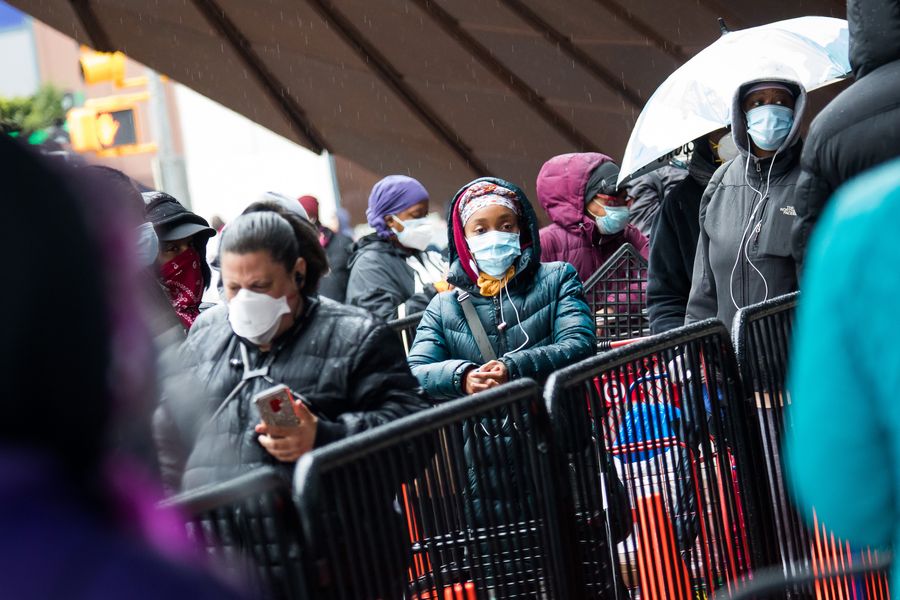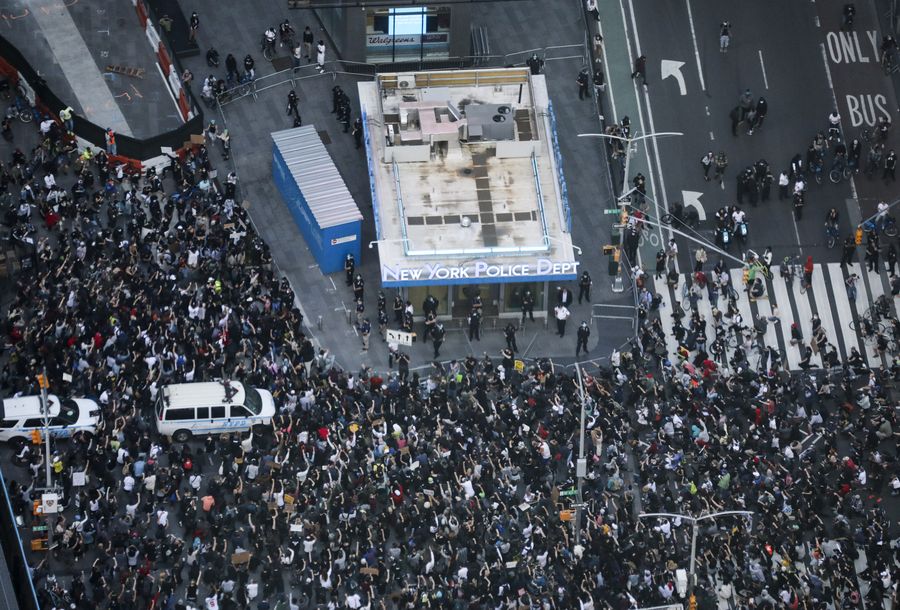-- In six consecutive days and nights till Sunday, riots flared up and quickly spread across the country as tens of thousands of people took to the streets over Floyd's death;
-- The COVID-19 pandemic, together with its economic shock, added new fuel to the systemic inequality and racism in the country, making racial conflicts much more likely;
-- As the pandemic unfolded, intensified partisan fights together with political polarization with an eye to general elections in November have also played an active role in brewing rage and tearing the country apart.

People rally in front of the White House during a protest over the death of George Floyd in Washington D.C., the United States, on May 31, 2020. (Xinhua/Liu Jie)
WASHINGTON, June 1 (Xinhua) -- The United States is in pain, anger and the "widest unrest for decades" over racial injustice after George Floyd, an unarmed black man, pleaded "I can't breathe" before dying in Minneapolis police custody a week ago.
The chronic racial wound in the United States is now smarting again. African Americans have suffered disproportionately high death rates from the COVID-19 outbreak, which has claimed over 100,000 lives and more than 40 million jobs in the nation so far.
In six consecutive days and nights till Sunday, riots flared up and quickly spread across the country as tens of thousands of people took to the streets over Floyd's death. Protesters threw projectiles at police and buildings, cars were set ablaze and numerous businesses looted.

An SUV of New York police department is burned during a protest over the death of George Floyd in the Brooklyn borough of New York, the United States, on May 30, 2020. (Photo by Michael Nagle/Xinhua)
Late on Sunday night, multiple fires were set near the White House as protesters were facing off with police firing tear gas and pepper spray. A symbolic landmark, the Lincoln Memorial in Washington D.C., was spray-painted with the words "Yall not tired yet?" a night earlier amid protests.
About 40 U.S. cities including the U.S. capital imposed curfews on Sunday night as more than a dozen states have activated National Guards or declared a state of emergency in response to the growing unrest. More than 4,000 arrests have been made and more are expected since violent protests and tensions are continuing.
"It was more than just his (Floyd's) death. It was the way he died, in front of our eyes, on video everywhere, pleading for his life, that had angry people spilling into the streets of cities across this country," said Mitch Albom with Detroit Free Press on Sunday.

Police officers stand in formation in Minneapolis, the United States, on May 30, 2020. (Photo by Angus Alexander/Xinhua)
Floyd, aged 46, died on May 25 after a white police officer held him down with a knee on his neck for at least eight minutes though he repeatedly pleaded, "I can't breathe," and "please, I can't breathe." A video recording the moment went viral on social media the next day, sparking a national outcry for justice.
"The issue for blacks is a well-grounded personal sense that their lives are at immediate risk in any interaction with police," Clay Ramsay, a senior research associate at the Center for International and Security Studies at the University of Maryland, told Xinhua in an interview on Sunday.
"If you are not white, you are five times more likely to be killed by police than if you are white," said Ramsay, adding that U.S. police are heavily armed and have a well-known tendency to use excessive force.

People wait in line at a food bank distribution site in New York, the United States, on April 24, 2020. (Photo by Michael Nagle/Xinhua)
Floyd's death showed the "open wound" of the nation's systemic racism, presumptive Democratic presidential nominee Joe Biden said, urging the "nation furious at injustice" to refrain from violence amid protests.
The COVID-19 pandemic, together with its economic shock, added new fuel to the systemic inequality and racism in the country, making racial conflicts much more likely, observers said.
Data compiled by the non-partisan APM Research Lab in late May revealed that the COVID-19 outbreak has aggravated racial inequality in the United States as African Americans are suffering a disproportionate share of poor health and economic blows from the pandemic.

Community members clean up debris after a protest over the death of George Floyd in Minneapolis, the United States, on May 30, 2020. (Photo by Angus Alexander/Xinhua)
With a death toll of more than 20,000 or about one in every 2,000 of the entire U.S. African American population, African Americans are dying at a rate of 50.3 per 100,000 people, compared with 20.7 for whites, 22.9 for Latinos and 22.7 for Asian Americans, the data showed.
"COVID-19 has hit non-whites far out of proportion to their part of the U.S. population; the economic shock that came out of COVID-19 has hit non-whites the same way," said Ramsay.
One in four U.S. workers has applied for unemployment benefits since the pandemic took hold in March and that pain was highly concentrated among low earners. A full 39 percent of former workers living in a household earning 40,000 U.S. dollars or less lost work, compared with 13 percent of those making more than 100,000 dollars, a Fed official said earlier last month.

Riot police officers arrest a small group of protestors at a memorial to George Floyd in Minneapolis, the United States, on May 30, 2020. (Photo by Angus Alexander/Xinhua)
In Floyd's case, the fatal arrest began as a police response to a 911 call claiming the black man, who had lost his job as a security guard due to layoffs in the outbreak, possibly used a fake 20-dollar bill at a local food store in the biggest city of the U.S. Midwest state Minnesota.
"Where people are broke, and there doesn't appear to be any assistance, there's no leadership, there's no clarity about what is going to happen, this creates the conditions for anger, rage, desperation and hopelessness, which can be a very volatile combination," said Keeanga-Yamahtta Taylor, an assistant professor of African American studies at Princeton University.
Moreover, as the pandemic unfolded, intensified partisan fights together with political polarization with an eye to general elections in November have also played an active role in brewing rage and tearing the country apart.

Healthcare workers wheel a patient into the emergency room at Brooklyn Hospital Center in New York, the United States, on April 14, 2020. (Photo by Michael Nagle/Xinhua)
Amid the national outrage, U.S. President Donald Trump has pledged a crackdown on the violent protests, tweeting "when the looting starts, the shooting starts" while calling Minneapolis protesters "thugs" on social media. Twitter added a warning label to the tweet for "glorifying violence."
Some Democrats and Republicans are concerned that the president's remarks might deepen the divide in a country already unnerved by a pandemic, distressed economy and racial unrest, according to a CNN report.
"There's been an uptick in tension and hatred and division since (Trump) came along," New York City Mayor Bill de Blasio said in a news conference on Saturday. "It's just a fact."

Demonstrators protest against police brutality on Times Square in Manhattan of New York, the United States, on May 31, 2020. (Xinhua/Wang Ying)
"It's never just about a precipitating incident that resulted in the unrest," Darnell Hunt, dean of Social Sciences at the University of California, Los Angeles, told New York Times columnist Michelle Goldberg. "It's always a collection of factors that make the situation ripe for collective behavior, unrest and mobilization."
"Now, though, we might be at the start of a long, hot summer of civil unrest," said Goldberg, calling the United States "a tinderbox" since the economic ruin from the pandemic is just beginning.
(Video reporters: Hu Yousong, Tan Yixiao, Xu Jing, Zhang Mocheng, Gao Shan, Wei Ying; Video editor: Wei Yin)■



